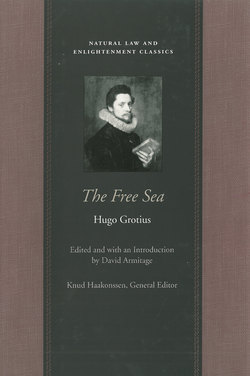Читать книгу The Free Sea - Hugo Grotius - Страница 16
На сайте Литреса книга снята с продажи.
ОглавлениеCHAPTER 4
That the Portugals have no right of dominion over the Indians by title of war
These things therefore being taken away, seeing it is manifest (which even Victoria writeth) that the Spaniards’ sailing to those remote countries brought no right with them of possessing those provinces, one only title of war remaineth which, though it had been just, yet could not profit them for dominion but by the right of prey, to wit, after the possession.1 But it is so far from the matter that the Portugals possessed those things that they had no war at that time with many nations to whom the Hollanders went and so therefore no right could be gotten to them when also, if they had received any injuries from the Indians, they are supposed to have forgiven them by reason of the long peace and friendly traffic with them.
Although there were no cause truly that they should pretend war. For they who pursue the barbarians with war, as the Spaniards do the people of America, are wont to pretend two things: that they are hindered from trading with them, or because they will not acknowledge the doctrine of true religion.2 As for trading, the Portugals obtained it of the Indians, so that in this behalf they have no reason to complain. The other pretence is no juster than that of the Grecians against the barbarians whereat Boethius aimed:
an distant, quia dissidentque mores,
injustas acies, et fera bella movent,
alternisque volunt perire telis?
non est justa satis saevitiae ratio. 3
But this is the conclusion both of Thomas and the Council of Toledo, and Gregory and the divines and canonists and almost all the civilians:4 although faith be declared to the barbarians (for concerning those who were subject before to Christian princes and also of apostates, the question is otherwise) probably and sufficiently and they will not respect it, yet notwithstanding it is not lawful for this reason to pursue them with wars and spoil them of their goods.5
It is needful to set down the very words of Cajetan to this purpose:
Certain infidels (saith he) neither in law nor in deed are subject to Christian princes as touching temporal jurisdiction, as they are found pagans who never were subject to the empire of Rome, inhabiting countries where the Christian name never came. For the lords thereof, although infidels, are lawful lords, whether they be governed by regal or politic government, neither are they deprived of the dominion of their lands or goods for their infidelity, seeing dominion is by a positive law and infidelity by the divine law which taketh not away the law positive, as is handled in the question before. And touching these, I know no law concerning temporal things. Against these no king, no emperor, nor the Church of Rome itself, can make war to possess their countries or subdue them temporally because there is no just cause of war, seeing Jesus Christ, the king of kings, to whom power is given in heaven and in earth, hath not sent soldiers of an armed warfare to take possession of the world but holy preachers as sheep among wolves. Whereupon I do not read in the Old Testament where possession was to be taken by arms that war was proclaimed against any country of the infidels because they were infidels but because they would not grant passage or because they had offended them, as the Midianites, or that they might recover their own granted unto them by the divine liberality. Wherefore we should grievously offend if we went about to spread the faith of Jesus Christ by this means, nor should we be lawful lords over them but should commit great robberies and were bound to make restitution as unjust conquerors and possessors. Good preachers should be sent unto them who by the word and their good example should convert them unto God, and not such as might oppress, spoil, offend and conquer them and make them twice more the children of hell after the manner of the Pharisees.6
And after this manner we hear it hath been often decreed by the senate in Spain and divines (but chiefly the Dominicans) that the Americans are to be converted to the faith by the preaching of the word only and not by war, and that the liberty also which had been taken from them for that cause should be restored, which is said to be approved of Paulus III the Pope and the emperor Charles the Fifth, king of Spain.7
We omit to speak that the Portugals now in most parts promote not religion nor so much as do there endeavor, seeing they are wholly bent to lucre, nay and that also to be true there which a Spaniard writ of the Spaniards of America, that no miracles, no signs and tokens, are to be heard of, no examples of a religious life which might vehemently persuade others to the same faith, but many scandals, many wicked deeds, many impieties.8
Wherefore, seeing both possession and title of possession fail, neither the substance nor jurisdiction of the Indians should be accounted in that nature as if they had been no man’s before, neither seeing they were theirs could be rightly gotten by others. It follows that the peoples of India of whom we speak are not proper to the Portugals but free and in their own power, whereof the very Spanish doctors themselves make no question.
